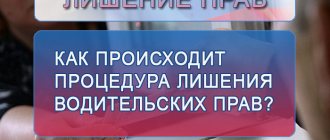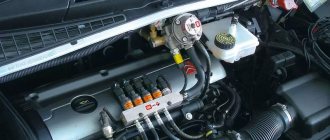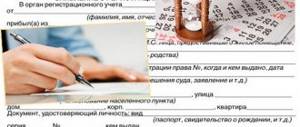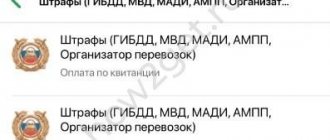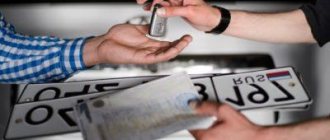| Question | Answer |
| Is it possible not to present documents if the inspector does not indicate the reason for the stop? | Yes, you can refuse to present documents. |
| What grounds might an inspector have for stopping a vehicle? | — when an inspector visually identifies or records through technical means signs of a violation; — if there is information about the involvement of the driver or passenger(s) in an accident, crime or administrative offense; - if there is certain information regarding the location of the car being wanted or stolen; — a stop can be made if you witness an accident or a crime committed; - if he needs to attract an attesting witness; — when performing administrative and regulatory actions; — if it is necessary to provide your vehicle to traffic police officers or medical staff; — to provide assistance to police officers or victims; - when carrying out activities, the implementation of which complies with administrative acts. This is done in order to check the vehicles for the presence of prohibited goods or wanted people. |
| Can a vehicle be stopped to check documents? | Yes, but such a stop should only be made at a traffic police post. |
| By what means can a vehicle be forced to stop? | - with a baton, gas canister, pistol and other means used to force a stop. - special signal for prohibition or movement. — blocking traffic with a patrol car with its lights on. - in extreme cases - even with firearms. |
| Can an inspector stop a car on a road section where stopping is prohibited? | In general, no. However, exceptions may be made when the reason for such a stop is the need to suppress a crime or offense, or a threat to the lives of road users. |
| Can the inspector use your car? | Yes, but you must remain the driver. |
| Is any document issued indicating that a police officer used a vehicle? | Yes, if the driver asks, he will be given a certificate or an entry will be made on the waybill, which will indicate the duration of the trip and other information required for such a case. |
| Does the inspector have the right to stop a car without reason? | No, you can only stop your car for a specific reason. |
The procedure for measuring noise in a car - does non-compliance with SANPIN lead to a ban on operation?
Control over compliance with traffic rules is entrusted to traffic police officers, who are vested with certain powers. Since 2017, a new regulation of the Ministry of Internal Affairs has come into force, which regulates the justification and procedure for stopping vehicles at a stationary road service post and beyond, and the procedure for inspecting the documents of the vehicle driver.
In accordance with the Law of the Russian Federation “On Police,” a traffic police officer has the right to stop a vehicle in order to fulfill his official duties to ensure road safety. Such actions are legal if there are certain reasons, for example, violation of traffic rules, guidance on detaining the driver of a car that is wanted, etc.
Stopping a vehicle in accordance with Order of the Ministry of Internal Affairs No. 185 must be carried out in places not prohibited by traffic rules. The right of a traffic police officer to inspect the documents of a car driver is described in the Administrative Code.
How to properly tow with a rigid or flexible hitch - what do the traffic rules say?
The grounds for stopping, checking documents, and the procedure for the inspector’s actions are also enshrined in the Administrative Regulations of the Ministry of Internal Affairs dated August 23, 2017 No. 664, which came into force in October 2021.
All regulations governing traffic rules are freely available, which the driver must familiarize himself with.
Legislative justification
The procedure for checking a driver's license, car passport, and insurance certificate is included in the list of government measures provided for in paragraph 31 of the Administrative Regulations of the State Traffic Safety Inspectorate of the Ministry of Internal Affairs of the Russian Federation. Subsection 63 of Order No. 185 of the Ministry of Internal Affairs of Russia dated March 2, 2009 indicates that stopping vehicles to familiarize themselves with the accompanying papers is allowed only at a stationary patrol post.
Document checks by traffic police officers outside a stationary post are carried out during operational actions carried out by law enforcement agencies.
My own lawyer
In order to check documents, any vehicle (including special ones) can be stopped by any police officer (not just a traffic police inspector), as well as (in very rare cases, during special operations) an FSB (Federal Security Service) and FSO (Federal Security Service) officer. security). But any of the above employees must be in the appropriate uniform, with a badge containing his personal number. A police or intelligence officer must introduce himself to the driver and state the reason for the stop. In this case, the reason is document verification. An employee of the Transport Inspection can stop only trucks and buses to check certain documents and cargo.
The driver has the right to ask to see the driver who stopped him and even take a photo of him (clause 2.4 of the Russian Traffic Regulations). Of course, no one will give the driver a license, but they must present it so that the driver can read all the information contained in the certificate. Police officers can check all the documents that the driver is required to carry with him (in accordance with paragraph 2.1.1 of the Russian Federation Traffic Regulations), namely: - driver’s license; — vehicle registration certificate; — original MTPL insurance policy; — waybill (power of attorney of the established form for legal entities); — license (card) for transportation of goods or passengers (in certain cases); — documents for the transported cargo (in certain cases). They can also check the personal passports of the driver and passengers. Employees of the Transport Inspectorate have the right to check only: - waybills for drivers of trucks and buses (regardless of their form of ownership); — license (card, permit) for transportation of goods or passengers (in certain cases); — documents for the transported cargo (in certain cases). Many drivers refer to the “Instructions for the work of traffic police”, in paragraph 13.7g of which it is written that document checks should be carried out only at stationary traffic police posts, and a traffic police patrol car (even several cars) is not considered a stationary post. “Manuals on the work of traffic police” is an order of the Ministry of Internal Affairs of the Russian Federation No. 297 dated April 20, 1999, which aims to organize the work of traffic police inspectors and is in no way a law for an ordinary driver. But here, in paragraph 13.7g, it is said that in the event of special operations, it is allowed to stop the vehicle outside the stationary traffic police posts to check documents. Whether a special operation is currently being carried out or not is closed information for the driver. But the most important thing is that there is nothing wrong with checking documents: the loss of time is minimal, if, of course, all the driver’s documents are in order. And if things are not in order, there is no one to rely on, it’s your own fault! Failure to comply with a lawful request of a police officer to stop a vehicle is punishable by a fine under Article 12.25. Parts 2-3 of the Code of Administrative Offenses of the Russian Federation. When your car is stopped by a traffic police inspector, do not get out of the car, as no one requires this of you. Having opened the window slightly, ask about the reason for the stop, if the inspector did not explain it. If you were stopped somewhere on a highway outside a populated area at night, to check your documents, did not identify yourself, and were asked to get out of the car, then lock the doors in advance and do not get out; lock the doors, show documents through glass and ask police officers to show their IDs. If a police officer introduces himself and shows his identification (say, you violated traffic rules), and you are afraid that you were stopped by “werewolves in uniform” (and this, unfortunately, happens) - do not go out, show your documents through the glass and ask to be escorted to the nearest police station or stationary traffic police post to complete all the paperwork there. You have every right to do this - you are not refusing punishment, you are trying to protect yourself and your loved ones. You can, having with you a list of telephone numbers of your own security services (hotline of the Ministry of Internal Affairs) by region of the country, immediately after examining the certificates of traffic police inspectors, without leaving your car, call there to find out whether these inspectors work as part of the traffic police unit of this region and if works, then where it should be currently.
Actions of the driver when stopped by a mobile traffic police patrol to check documents
Deliberate actions during contact with employees of the control service will give a legal and psychological advantage to the motorist when subsequently protesting the groundless demands of authorized government officials.
The optimal sequence is determined by the instructions of departmental norms, Traffic Rules, Road Control Regulations, and laws of the Russian state:
- Stop the car at the place indicated by the traffic police officer.
Attention. Ignoring a lawful request of a police officer is considered an administrative violation (Article 19.3 of the Code of Administrative Offenses of the Russian Federation).
- After waiting inside the inspector’s car, clarify the reason for the stop, the name, rank, division, and powers of the one who interrupted the movement.
- Familiarize yourself with the patrolman's service ID, paying attention to the period of validity of the document, the presence of a distinct seal, and compliance with the individual bib number.
- The reliability of the data presented is confirmed or denied by the traffic police on duty by calling the hotline.
- Referring to paragraph 7 of Article 5 of Law No. 3-FZ “On the Police,” which guarantees the opportunity to familiarize yourself with materials affecting the interests of a citizen, demand documentary evidence of the ongoing operational activity that led to the forced interruption of the trip.
Attention. The inspector's reference to internal closed standards is illegal due to Art. 15 of the Constitution, which prohibits the application to individuals of acts that have not been published for public information.
- With convincing justification, give the inspection officer the opportunity to check the documents specified in the Road Traffic Rules.
- An appeal against an abuse of power by the security control service is allowed within ten days after the event.
If a person dressed in uniform does not have a badge or official identification, law enforcement agencies should be immediately reported.
Verification procedure
The inspector may request from the citizen driving the vehicle a specific list of documents. A passport or other identity document is checked when:
- Non-compliance with traffic rules or an administrative offense committed by a specific citizen has been recorded;
- There are objective facts of document falsification;
- The inspector has information that the citizen driving the transport is a criminal;
- There is a need to involve the driver as a witness or witness.
During special events, inspection of the car and the cargo in it, an authorized employee has the right to request a document to carry out driving activities (permit or license). An additional basis for their inspection is the fact of violation of standards for ensuring safe traffic.
How to communicate with traffic police officers
Documentation, registration plates and markings are checked visually. If suspicions arise about their authenticity, special technical devices are used to accurately identify a fake. To confirm or refute suspicions, the inspector has the right to contact investigative and specialized structures or internal affairs bodies.
Motivation for the procedure
The grounds for revising documents of road users are determined by the content of clause 82 of the regulatory order:
- Detection of non-compliance with road traffic rules.
- Conducting operational actions by the police.
- Search processes based on information and information materials.
- Control measures carried out by squads of stationary service posts.
- Targeted orders of the traffic police leadership on the introduction of verification law enforcement regimes for permanent road units.
Document research methods
The legal regulations of the Ministry of Internal Affairs establish acceptable methods for analyzing certificates and vehicle markings:
- visual control of documents;
- vehicle inspection;
- use of reference, search, and operational materials from federal accounting information databases;
- use of specialized devices.
Important. Referring to the records of the State Traffic Inspectorate when registering an administrative offense is mandatory.
Driver's actions when checking documents by traffic police officers
The person who was driving the car before the inspector stopped at a stationary post is obliged to present for inspection the documents provided for in subsection 2.1.1 of the Russian Road Traffic Rules:
- Certificate for the right to drive transport of the appropriate category;
- Certificate of registration of mechanical equipment by government departments;
- Insurance policy.
Reference. The Code of Administrative Offenses imposes arrest or a fine for refusal to comply with the reasonable demands of a police officer.
Reasons for checking the driver's documents
In accordance with the new Administrative Regulation No. 664, police officers have the right to stop vehicles and check documents of drivers at stationary traffic police posts and beyond. At the same time, the places in which the traffic police inspector can exercise such a right are determined by the leadership of the department.
What to do if your car has been towed - where to call the driver?
The choice of duty station is based on an analysis of the accident rate on the road, as well as the presence of potentially dangerous areas. Such innovations are associated with a sharp decrease in the number of traffic police posts.
In accordance with Art. 84 of the Order of the Ministry of Internal Affairs No. 664, the grounds for stopping a vehicle are:
- neglect of traffic rules, the fact of which was recorded visually or using special stationary or portable technical means;
- orientation or information from the duty officer about the involvement of the vehicle in an accident or other offense;
- information that the car is stolen or wanted;
- the driver of the car is a witness to an incident on the road;
- the driver is involved as a witness;
- the traffic police representative needs to use the vehicle for official purposes;
- traffic containment/prohibition;
- ensuring the passage of special-purpose vehicles;
- providing assistance to other road users before the arrival of medical services;
- scheduled vehicle inspection;
- presence of a threat to traffic safety;
- inspection of documents confirming the right to drive a car;
- existence of grounds for detaining the driver or passengers of the vehicle.
After stopping in accordance with Art. 106 of the Administrative Regulations of the Ministry of Internal Affairs No. 664, a patrol officer of the State Traffic Inspectorate may request documents for verification based on:
- obvious disregard for traffic rules;
- orientation, other information that indicates that the driver or other persons in the vehicle are participants in an accident or other offense;
- the car is listed as wanted or stolen;
- order to carry out an operation to reduce the accident rate and severity of accidents on the roads.
In addition, the traffic police inspector has the right to inspect the driver’s identification documents in the following cases:
- traffic rules were violated;
- availability of data to initiate a case of an unlawful act, based on the Code of Administrative Offences;
- suspicion of falsification of documentation for vehicles or cargo;
- the citizen is suspected of committing other crimes;
- the driver is involved by the inspector as a witness or witness.
There is no time for bureaucracy in the traffic police - a power of attorney will help!
A traffic police officer has the right to check a license to carry out a certain type of activity during special measures to reduce accidents, when checking cargo or violating traffic rules.
Appealing the actions of a traffic police officer
The traffic police regulations establish two ways to resolve the conflict:
- Appeal to senior managers of the department who committed violations.
- Judicial procedure.
In the pre-trial approach, the complaint is filed arbitrarily, but with the obligatory indication of information:
- Position, surname of the addressee;
- Details of the protester;
- The circumstances of the offense committed by the traffic police officer;
- Describes the attached documentary and material evidence of the official's guilt (video, audio recording of the incident, copies of unauthorized decisions, witness testimony);
- Date of preparation.
The message is sent in a convenient way or delivered to the organization’s office in person. Officials are required to prepare a response to the complaint within 30 days. The filing of a lawsuit is carried out according to the norms of Russian legal proceedings.
